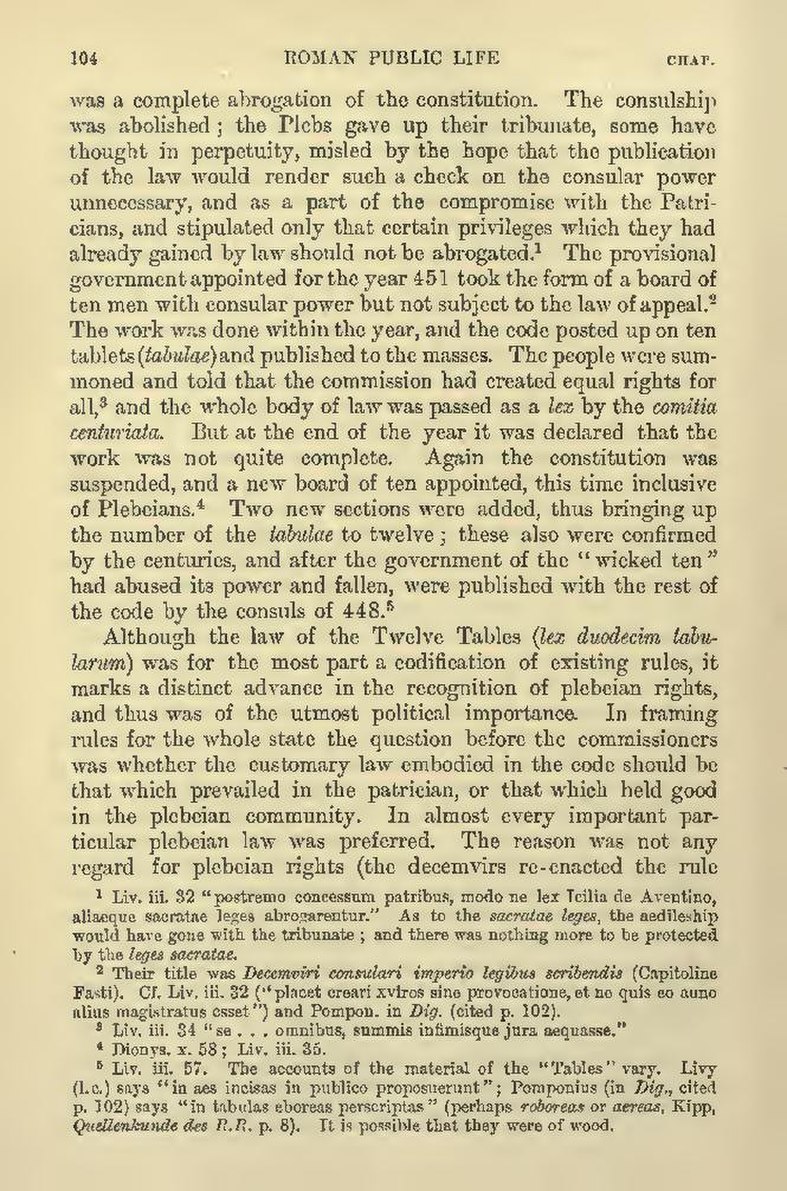was a complete abrogation of the constitution. The consulship was abolished; the Plebs gave up their tribunate, some have thought in perpetuity, misled by the hope that the publication of the law would render such a check on the consular power unnecessary, and as a part of the compromise with the Patricians, and stipulated only that certain privileges which they had already gained by law should not be abrogated.[1] The provisional government appointed for the year 451 took the form of a board of ten men with consular power but not subject to the law of appeal.[2] The work was done within the year, and the code posted up on ten tablets (tabulae) and published to the masses. The people were summoned and told that the commission had created equal rights for all,[3] and the whole body of law was passed as a lex by the comitia centuriata. But at the end of the year it was declared that the work was not quite complete. Again the constitution was suspended, and a new board of ten appointed, this time inclusive of Plebeians.[4] Two new sections were added, thus bringing up the number of the tabulae to twelve; these also were confirmed by the centuries, and after the government of the "wicked ten" had abused its power and fallen, were published with the rest of the code by the consuls of 448.[5]
Although the law of the Twelve Tables (lex duodecim tabularum) was for the most part a codification of existing rules, it marks a distinct advance in the recognition of plebeian rights, and thus was of the utmost political importance in framing rules for the whole state the question before the commissioners was whether the customary law embodied in the code should be that which prevailed in the patrician, or that which held good in the plebeian community. In almost every important particular plebeian law was preferred. The reason was not any regard for plebeian rights (the decemvirs re-enacted the rule
- ↑ Liv. iii. 32 "postremo concessum patribus, modo ne lex Icilia de Aventino, aliaeque sacratae leges abrogarentur." As to the sacratae leges, the aedileship would have gone with the tribunate; and there was nothing more to be protected by the leges sacratae.
- ↑ Their title was Decemviri consulari imperio legibus scribendis (Capitoline Fasti). Cf. Liv. iii. 32 ("placet creari xviros sine provocatione, et ne quis eo anno alius magistratus esset") and Pompon. in Dig. (cited p. 102).
- ↑ Liv. iii. 34 "se . . . omnibus, summis infimisque jura aequasse."
- ↑ Dionys. x. 58; Liv. iii. 35.
- ↑ Liv. iii. 57. The accounts of the material of the "Tables" vary. Livy (l.c.) says "in aes incisas in publico proposuerunt"; Pomponius (in Dig., cited p. 102) says "in tabulas eboreas perscriptas" (perhaps roboreas or aereas, Kipp, Quellenkunde des R.R. p. 8). It is possible that they were of wood.
